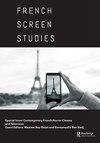Special dossier: French film studies in Australia
IF 0.5
2区 艺术学
0 FILM, RADIO, TELEVISION
引用次数: 0
Abstract
As I write this editorial, the Alliance Française French Film Festival (AFFFF) in Australia is drawing to a close. Beginning in 1989, this annual event is sponsored and co-run by the Alliance Française with support from the French Embassy, and provides a shop window for new French films. In terms of tickets sold and films screened, the AFFFF has grown to become the largest film festival dedicated to contemporary French cinema outside of France. Taking place in a dozen different cities and towns across the country, the AFFFF now screens over 50 new films each year and includes events such as debates, special guests and master classes (Zabou Breitman was a guest of the festival in 2020; Jacques Audiard came in 2019 and Benoît Jacquot in 2013). Now in its 33rd iteration, it attracts around 200,000 spectators annually and for many represents the cultural highlight of the year (Cojean 2019). An analysis of this year’s viewing trends reveals Australian audiences’ tastes and dispositions – the four most viewed films in the AFFFF nationwide were Adieu Monsieur Haffmann/Farewell, Mr. Haffmann (Fred Cavayé, 2022), Mes frères et moi/La Traviata, My Brothers and I (Yohan Manca, 2022), Illusions perdues/Lost Illusions (Xavier Giannoli, 2021) and La Brigade/The Kitchen Brigade (Louis-Jean Petit, 2022). There are no real surprises here: Australians, like most others in the Anglosphere, continue to gravitate towards costume dramas, family melodramas, social comedies and films set during the Occupation. They also help prop up the French star system – the fifth most viewed was Patrice Leconte’s Maigret (2002), an adaptation of Georges Simenon’s Maigret et la jeune morte, starring Gérard Depardieu. When the AFFFF artistic director and French embassy’s cultural attaché Karine Mauris was asked why Australians are so fascinated by French film, her reply was indicative of the extent to which French culture is all-pervasive in Australia:特别档案:在澳大利亚的法国电影研究
在我写这篇社论的时候,在澳大利亚举行的法语联盟电影节(AFFFF)即将结束。从1989年开始,这个一年一度的活动由法国文化联盟在法国大使馆的支持下赞助和共同举办,并为法国新电影提供了一个橱窗。在门票销售和电影放映方面,AFFFF已经发展成为法国以外最大的当代法国电影电影节。AFFFF每年在全国十几个不同的城镇放映50多部新电影,并包括辩论、特别嘉宾和大师班等活动(扎布·布莱特曼(Zabou Breitman)是2020年电影节的嘉宾;雅克·欧迪亚(Jacques Audiard)于2019年出生,贝诺··雅克(benot Jacquot)于2013年出生。今年是第33届,每年吸引约20万名观众,对许多人来说,它代表了今年的文化亮点(Cojean 2019)。对今年观影趋势的分析揭示了澳大利亚观众的品味和倾向——在AFFFF全国范围内观看最多的四部电影是:再见,哈夫曼先生/再见,哈夫曼先生(弗雷德·卡瓦伊,2022年),我的兄弟和我(约汉·曼卡,2022年),幻觉/失去的幻觉(泽维尔·扬诺利,2021年)和La Brigade/厨房旅(路易-让·佩蒂,2022年)。这里没有什么真正的惊喜:澳大利亚人,像大多数英语圈的其他人一样,继续被古装剧、家庭情节剧、社会喜剧和以占领时期为背景的电影所吸引。它们还有助于支撑法国的明星体系——收视率第五高的是帕特里斯·勒孔特的《麦格雷》(2002),改编自乔治·西梅侬的《年轻的麦格雷》,由格姆扎尔·德帕迪约主演。当被问及为什么澳大利亚人对法国电影如此着迷时,AFFFF的艺术总监兼法国大使馆文化专员Karine Mauris的回答表明了法国文化在澳大利亚无处不在的程度:
本文章由计算机程序翻译,如有差异,请以英文原文为准。
求助全文
约1分钟内获得全文
求助全文

 求助内容:
求助内容: 应助结果提醒方式:
应助结果提醒方式:


